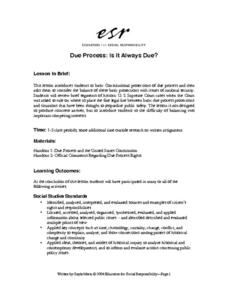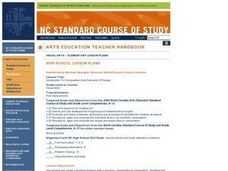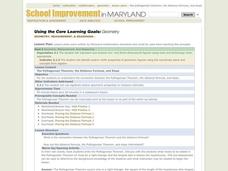Curated OER
Exploring the Slopes of Parallel and Perpendicular Lines.
Students find the slopes for perpendicular and parallel lines. In this geometry lesson, students differentiate between parallel and perpendicular lines. They use Cabri software to create lines to compare.
Curated OER
Create-A-Line Dance
Students demonstrate knowledge of the processes, principles, and structure of line dance. In groups students choreograph their own line dance, implementing moves learned from previous dances taught in the line dance unit.
Curated OER
Ratio Relationships
Students solve for the different ratio and proportion of a problem. In this geometry lesson plan, students show their knowledge of how to solve proportional relationships. They convert between percent, decimals and fractions.
Curated OER
Regulation - Human Nervous and Endocrine Systems
High schoolers explore homeostasis within the nervous and endocrine system with this Smart Board activity. In this biology lesson plan, students will fill in the know and want to know sections of a KWL chart as a class...
Curated OER
Eye in the Sky
Students use the Internet to broaden their knowledge and understanding of the Hubble Space Telescope by participating in an Internet scavenger hunt, searching for information about the objectives, past successes and repair of the telescope.
Curated OER
Music, Culture and War
Students see that music serves as a major conduit for the transport of knowledge. As they watch video, students tabulate the variety of music artists listed by different soldiers.
Curated OER
Governance - Grade 7
Students examine the governance of natives in Canada. In this native studies lesson, students read handouts on the Iroquois and Huron Confederacies and then respond to discussion questions about the 2 governance systems.
Curated OER
Why can't We Use SSA to Prove Triangles Congruent?
Students investigate triangles and congruences. For this geometry lesson, students differentiate between inductive and deductive reasoning. They differentiate between similar and congruent triangles.
Curated OER
Rollin' Down the River
Students examine the contributions of Lewis and Clark. In this Louisiana Purchase lesson plan, students research Internet and print sources regarding the Lewis and Clark expedition.
Curated OER
Why Opposites Attract: Observing Magnetic Fields
Pupils brainstorm background knowledge and any questions they may have about magnetic fields. They investigate the role that William Gilbert had in laying the groundwork for modern experimental science. Students observe magnetic fields...
Curated OER
The Origins of Man
Students learn about new technologies being used to update what is known about human evolution and migration. They then compare the new theories to the traditional knowledge.
Curated OER
Merchants and Craft Guilds
Students compare and contrast the craft guilds of the middle ages to the production of goods today. In this Middle Ages lesson, students discuss the structure of craft guilds after they have read articles on the topic. Students conduct...
Curated OER
Due Process: Is It Always Due?
Students explore the basic Constitutional protections of due process and then consider the balance of these basic protections with issues of national security. A variety of segments of U.S. Supreme Court cases are examined in this...
Curated OER
Introduction To Composition And Elements Of Design
Young scholars create a finished drawing with a dynamic, asymmetrical composition. Pencil sketches are encouraged for final projects. Students assess their own work prior to submitting the artwork.
Curated OER
Mix It Up Grammar!
Students review the parts of speech to begin the lesson. Using computers, they listen to instructions from their teacher and write the word under the categories respresenting the different parts of speech. Using the same word, they find...
Curated OER
The Pythagorean Theorem, the Distance Formula, and Slope
Students explore the concept of the Pythagorean Theorem. In this Pythagorean Theorem lesson, students derive the distance formula and slope of a line from the Pythagorean Theorem.
Curated OER
Multi-Media Hero Analysis
Learners consider how the attributes of heroes have evolved. In this character traits instructional activity, students define heroism in their culture and research the epic heroes of literature. Learners select heroes to write about and...
Curated OER
Using a Multi- Sensory Approach
Learners identify the slope of a line given two points on the line. In this algebra instructional activity, students solve linear equations by finding and comparing slopes of lines. They differentiate between the steepness of the slope...
Curated OER
The Impact of Hazelwood on School Publications
Ninth graders explore the Supreme Court Case Hazelwood School District v. Kuhlmeier. In this American Government lesson, 9th graders research the recent history of censorship and how the courts have been involved in either...
Curated OER
Teach Your Friends Polynomials
Students investigate polynomials. In this ninth or tenth grade mathetmatics lesson, students teach their peers the steps to adding, subtracting, multiplying, dividing, and factoring polynomials. Students create a PowerPoint...
Curated OER
X Is For Wonderment
Students engage in a lesson that is concerned with the "X" chromosome and how ti is part of genetics with the use of Punnett squares. They use this tool in order to predict future genetic outcomes while focusing upon specific questions.
Curated OER
Pre-Columbian Native Peoples and Technology
Students explore Pre-Columbian native cultures. In this Exploration Era lesson, students define the words "primitive," "civilized," and "technology." Students consider the connotations of the words and then investigate...
Curated OER
Constructing Perpendiculars
Students construct perpendicular lines. In this geometry lesson, students use a compass and straight edge to do construction. They start from a point to a line.
Curated OER
SAS Similarity Theorem
Students identify and use the similarity theorem. In this geometry lesson, students differentiate between congruent and similar triangles. They solve problems using the computer modifying shapes by dragging.























